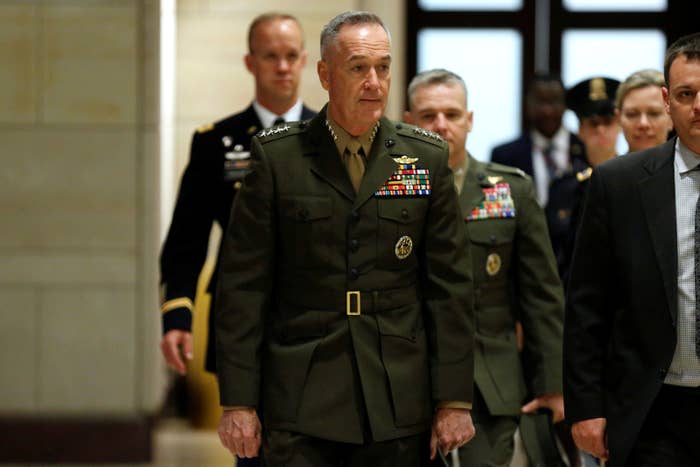
They’ve called President Donald Trump’s recent decision to launch airstrikes against the Syrian regime without congressional approval “illegal” and “reckless.” But lawmakers from both parties admit that, without more support in Congress for strictly enforcing its war-making powers, their hands are tied when it comes to potentially pushing back against the president.
“It’s beyond illegal — it’s unconstitutional,” Republican Rep. Thomas Massie said Tuesday after a classified briefing on the strikes from Defense Secretary James Mattis and Marine Gen. Joseph Dunford, the chair of the Joint Chiefs of Staff. “It violates the most important law of the land, and what makes me sad is I’ve come to realize you can do nothing unless 218 people care,” he said, referring to the number of members needed for a majority in the House.
The US Constitution grants Congress the power to declare war, and the War Powers Resolution of 1973 says the president may declare war only if the US is attacked. But the Constitution also names the president the commander-in-chief of the military — something numerous administrations have for years used, in part, to justify sending troops into conflicts around the world.
Trump announced on Friday night that, along with the UK and France, the US was bombing three sites associated with Syria’s chemical weapons program after forces loyal to President Bashar al-Assad launched a suspected chemical attack on civilians on April 7. Many in Congress supported the strikes, and others, such as Tennessee Republican Sen. Bob Corker, chair of the Senate Foreign Relations Committee, argued that the president’s constitutional authority allowed an isolated, “surgical” attack against a regime that had committed a horrific abuse of human rights — despite the US having launched a similar strike last year.
“Assad needed a punch in the nose. He got one,” Nebraska Republican Rep. Don Bacon said Tuesday.
Mattis and Dunford cited Article II, Section II of the Constitution — which names the president commander-in-chief — on Tuesday when Massie asked them for the legal basis of Friday’s strikes, lawmakers said. Trump, in a letter to Congress on Sunday, also argued that the strikes were justified through his “constitutional authority” and that they were in the US’s “vital national security and foreign policy interests.”
But lawmakers who questioned Trump’s authority to launch an attack said that in an ideal world, the administration would have a price to pay for failing to first seek an authorization for the use of military force, or AUMF.
“I don't know what we can do, but we need to do something to hold this president accountable — any president that does not adhere to our basic three branches of government [and] system of checks and balances,” said California Democratic Rep. Barbara Lee, who has also advocated for Congress’s war-making powers. “He didn't.”
These offensive strikes against Syria are unconstitutional, illegal, and reckless. The next speaker of the House must reclaim congressional war powers as prescribed in Article I of the Constitution. @SpeakerRyan has completely abdicated one of his most important responsibilities.
Massie said Congress “could do a lot” to check the president’s power. “But there are not 218 members here who are concerned about the president’s ability to act, in my opinion, in conflict with the constitution,” Massie said.
Asked what Congress could do if it had the numbers, and whether it would impeach the president over a military strike lawmakers didn’t authorize, Massie said: “No, I think the first thing we should do is preemptively make a statement that he cannot attack Iran or North Korea without coming here unless we are first attacked. We should restate that and what the ramifications would be from Congress if he did that. That’s my concern. I’m not as much concerned about this particular strike as I am about the implications of him doing it without Congress in the context of Iran or North Korea.”
Concern about military authorizations exists in the Senate, too, where a bipartisan group of senators on Monday revealed a new, separate AUMF for the global war on terror that would replace the 2001 and 2002 AUMFs multiple administrations have used to justify the sprawling conflict.
“‘Illegal’ isn’t quite the right word,” Conn Carroll, the communications director for Utah Sen. Mike Lee, said of the strikes in Syria. “There is no criminal statute that has been violated. That said, the president has acted outside his power and it is in the interest of Congress to guard their Article I war-making power.”
“There are many different things a unified Congress could do,” Carroll said.
Virginia Sen. Tim Kaine, one of three Democrats who sponsored Monday’s new authorization, also said “there’s a whole series of potential actions” Congress could take in response to the decision to strike Syria, which he called “illegal and — absent a broader strategy … reckless.”
“You can block appropriations, but we just did an appropriations bill,” he said. “My focus is, let’s get the authorization right that we’re working on now and let’s continue to press the administration on what their strategy is in Syria.”
But blocking military funding or any other punitive measure would only be possible “if you had a majority of the Senate stand up and have the ambition to enforce the Constitution,” said Kentucky Sen. Rand Paul, another Republican who has been a vocal proponent of AUMF. “The Constitution’s a great guide, but if the separation of powers and the branches of government don’t try to enforce it, it’s not enforceable.”

